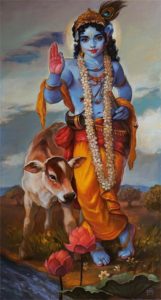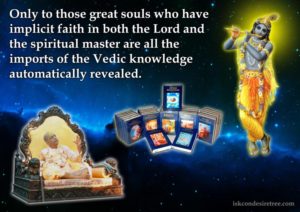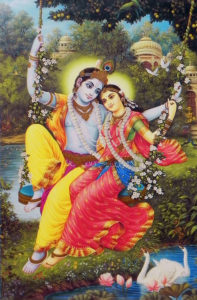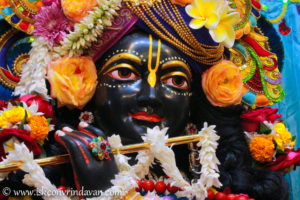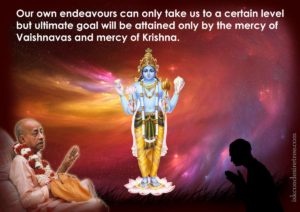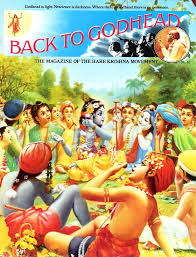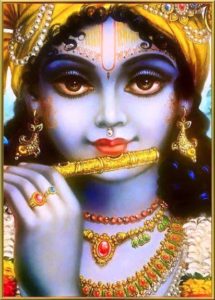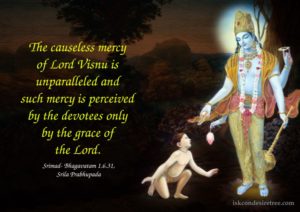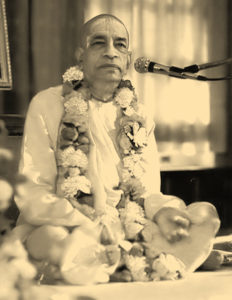
Hare Krishna dear devotees,
Sometimes this question gets popped up in discussions ‘why did Srila Prabhupada speak so much against mayavada and voidism?’ He went head on against both the philosophies. For many of us who were brought in a broad minded liberal mindset (read hodge-podge) such sharp criticism, coming specially from a highly evolved spiritual personality, may seem a bit out of place.
Srila Prabhupada’s pranama mantra itself boldly declares his intention, and scope, in no uncertain terms.
नमःॐविष्णुपादय, कृष्णपृष्ठायभूतले, श्रीमतेभक्तिवेदांतस्वामिनइतिनामिने।
नमस्तेसरस्वतेदेवेगौरवाणीप्रचारिणे, निर्विशेषशून्य-वादीपाश्चात्यदेशतारिणे।।
I offer my respectful obeisances unto His Divine Grace A. C. Bhaktivedanta Swami Prabhupada, who is very dear to Lord Krishna, having taken shelter at His lotus feet. Our respectful obeisances are unto you, O spiritual master, servant of Bhaktisiddhanta Saraswati Goswami. You are kindly preaching the message of Lord Chaitanyadeva and delivering the Western countries, which are filled with impersonalism and voidism.
HG Bhurijana Prabhu, in a recent class, shared an interesting pastime during a program in Japan, when Srila Prabhupada, did not let a mayavadi sanyasi speak for too long, starting a impromptu Kirtan in the middle of his speech, much to the bewilderment of the audience. Srila Prabhupada, later, shared with his disciples that he could tolerate the mayavadi sanyasi for some time but when he started speaking that Supreme Lord has no form, no senses, can not talk and so on, then Prabhupada could not tolerate it any more! HG Bhurijan Prabhu said that such is the love Srila Prabhupada has for Krishna that he could not tolerate anyone speaking that his beloved and most beautiful Lord does not possess any beauty, any form, any taste, etc. It simply showed his level of attachment to Krishna.
Whats so wrong these philosophies?
Krishna says in BG 4.10
vīta-rāga-bhaya-krodhā man-mayā mām upāśritāḥ
bahavo jñāna-tapasā pūtā mad-bhāvam āgatāḥ
Being freed from attachment, fear and anger, being fully absorbed in Me and taking refuge in Me, many, many persons in the past became purified by knowledge of Me — and thus they all attained transcendental love for Me.
Krishna is saying that once one gets free from attachment, fear & anger, and being aware that He is the Supreme Lord and everyone is His part and parcel, surrendering unto Him, then one become fully absorbed in Him. And the result of such an absorption, based on knowledge (not just sentiments), is that one will attain transcendental love for Krishna, our final goal.
Srila Prabhupada begins his purport to the above verse : It is very difficult for a person who is too materially affected to understand the personal nature of the Supreme Absolute Truth.
Srila Prabhupada then goes into detail, in the same purport, and explains the three popular philosophies prevalent in western countries
- Materialism
- Mayavada
- Voidism
Materialists: People who are attached to the bodily conception of life are so absorbed in materialism that it is almost impossible for them to understand how the Supreme can be a person. Such materialists cannot even imagine that there is a transcendental body which is imperishable, full of knowledge and eternally blissful. In the materialistic concept, the body is perishable, full of ignorance and completely miserable. Therefore, people in general keep this same bodily idea in mind when they are informed of the personal form of the Lord. For such materialistic men, the form of the gigantic material manifestation is supreme.
Mayavada : Consequently they consider the Supreme to be impersonal. Generally, because they are too materially absorbed, the conception of retaining the personality after liberation from matter frightens them. When they are informed that spiritual life is also individual and personal, they become afraid of becoming persons again, and so they naturally prefer a kind of merging into the impersonal void. Generally, they compare the living entities to the bubbles of the ocean, which merge into the ocean. That is the highest perfection of spiritual existence attainable without individual personality. This is a kind of fearful stage of life, devoid of perfect knowledge of spiritual existence.
Voidism: Furthermore there are many persons who cannot understand spiritual existence at all. Being embarrassed by so many theories and by contradictions of various types of philosophical speculation, they become disgusted or angry and foolishly conclude that there is no supreme cause and that everything is ultimately void. Such people are in a diseased condition of life.
So, surprisingly, the rāga-bhaya-krodhā (attachment, fear and anger) Krishna is speaking about are not exactly how we understand these terms, in reality they mean
- attachment to material life
- fear of a spiritual personal identity
- the conception of void that arises from frustration in life
How do I get free from them?
To get free from these three stages of the material concept of life, one has to take complete shelter of the Lord, guided by the bona fide spiritual master, and follow the disciplines and regulative principles of devotional life.
Srila Prabhupada then writes the complete road map, from faith to Prema, via Krishna consciousness
“In the beginning one must have a preliminary desire for self-realization. This will bring one to the stage of trying to associate with persons who are spiritually elevated. In the next stage one becomes initiated by an elevated spiritual master, and under his instruction the neophyte devotee begins the process of devotional service. By execution of devotional service under the guidance of the spiritual master, one becomes free from all material attachment, attains steadiness in self-realization, and acquires a taste for hearing about the Absolute Personality of Godhead, Śrī Kṛṣṇa. This taste leads one further forward to attachment for Kṛṣṇa consciousness, which is matured in bhāva, or the preliminary stage of transcendental love of God. Real love for God is called prema, the highest perfectional stage of life.” In the prema stage there is constant engagement in the transcendental loving service of the Lord.
So this is the role Srila Prabhupada is playing in Krishna’s (actually Mahaprabhu’s) plan for mass liberation, to save the suffering souls in kali-yuga by
- freeing us from material attachment, rāga (sense gratification)
- freeing us from the fearfulness of one’s individual spiritual personality, bhaya (mayavada)
- freeing us from the frustration that results in void philosophy, krodhā (voiodism)
Prabhupada through his books, instructions and lectures gave the suffering humanity a complete, and solid, path leading to the highest stage, Krishna Prema, Love of Godhead, ultimately leading to the abode of the Supreme Lord- Goloka Vrindavana. All his activities, all the resources which came by his side, were used by him in Krishna’s service, till his very last breath. Prabhupada walked the path Krishna planned for him, similar to how Arjuna followed Krishna’s instructions and fought the war in Kurukshetra, which Krishna had already planned. Both of them became an instrument in Krishna’s hands with no self interest or self desire. This movement is popularly known as ‘Hare Krishna’ all over the world, he did not name it after himself. So all over the world people became aware of Krishna’s name but who is Srila Prabhupada!
Krishna says there is no greater devotee!
tasmān mayy arpitāśeṣa-kriyārthātmā nirantaraḥ
mayy arpitātmanaḥ puṁso mayi sannyasta-karmaṇaḥ
na paśyāmi paraṁ bhūtam akartuḥ sama-darśanāt
Therefore I do not find a greater person than he who has no interest outside of Mine and who therefore engages and dedicates all his activities and all his life — everything — unto Me without cessation.
(SB 3.29.33)
Srila Prabhupada writes in the purport of above verse :
In this verse the word sama-darśanāt means that he no longer has any separate interest; the devotee’s interest and the Supreme Personality of Godhead’s interest are one. For example, Lord Caitanya, in the role of a devotee, also preached the same philosophy. He preached that Kṛṣṇa is the worshipful Lord, the Supreme Personality of Godhead, and that the interest of His pure devotees is the same as His own.
Prabhupada again bashes up the mayavada theory!
Sometimes Māyāvādī philosophers, due to a poor fund of knowledge, define the word sama-darśanāt to mean that a devotee should see himself as one with the Supreme Personality of Godhead. This is foolishness. When one thinks himself one with the Supreme Personality of Godhead, there is no question of serving Him. When there is service, there must be a master. Three things must be present for there to be service: the master, the servant and the service. Here it is clearly stated that he who has dedicated his life, all his activities, his mind and his soul — everything — for the satisfaction of the Supreme Lord, is considered to be the greatest person.
The word akartuḥ means “without any sense of proprietorship.” Everyone wants to act as the proprietor of his actions so that he can enjoy the result. A devotee, however, has no such desire; he acts because the Personality of Godhead wants him to act in a particular way. He has no personal motive. When Lord Caitanya preached Kṛṣṇa consciousness, it was not with the purpose that people would call Him Kṛṣṇa, the Supreme Personality of Godhead; rather, He preached that Kṛṣṇa is the Supreme Personality of Godhead and should be worshiped as such. A devotee who is a most confidential servant of the Lord never does anything for his personal account, but does everything for the satisfaction of the Supreme Lord. Therefore it is clearly stated, mayi sannyasta-karmaṇaḥ: the devotee works, but he works for the Supreme. It is also stated, mayy arpitātmanaḥ: “He gives his mind unto Me.” These are the qualifications of a devotee, who, according to this verse, is accepted as the highest of all human beings.
So in a way Srila Prabhupada became the hand of Krishna. This hand went to the lowest depths on this planet. And to save us he had to smash the very foundation of senseless material gratification, mayavada & voidism, to free us from material attachment, fear and anger. Thereby delivering and uplifting millions of souls from the very bottom of the pit to the highest platform of Vaishnavism.
The Absolute Nature of ‘Sad-guru’
In a sense guru is like the hand attached to the body of God, Who is all existence, all intelligence, and all bliss (sac-cid-änanda-vigraha). With His hand, God rubs His own feet. The hand of God is His own limb. In this case God is serving Himself. God Himself appears as the guru in order to teach how to serve Himself. Our Gurudeva is also one with the body of God. There is God to be served, there is also God who serves; God as object and God as support. Mukunda is God to be served, He is the object God. The most beloved of Mukunda, Çré Gurudeva, is serving God, the support. There is no one so dearly loved by God as our Gurudeva. He alone is the best beloved of the Lord.
— Çrila Bhaktisiddhänta Sarasvaté Öhäkura, Vyäsa-Püja lecture, 1936.
All glories to Sri Guru and Gauranga.
All glories to Srila Prabhupada.
your servant,
Giriraj dasa
Like this:
Like Loading...



